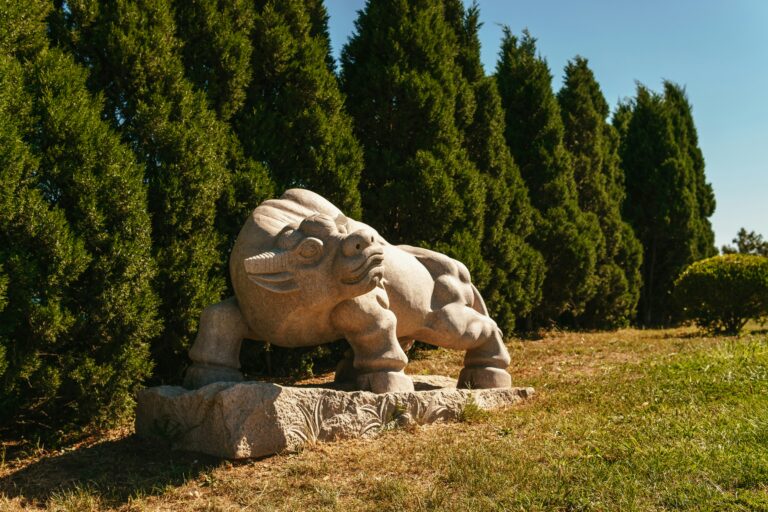“I am the beginning
on this side
nearest the town”
—Charles Olson
The Village was just that,
one of many living in the mountains of Liaoning
(where He of Ten Thousand Small Sufferings ascends)
North of The Ocean, South of The Submerged City.
There are ten thousand mountains, Grandmother says,
but the maps by those far off show only a thousand.
Satellites from space cannot hope to walk the narrow roads
fit only for human feet.
This is The Mountain, Grandmother says,
capital letters significant like the capital city that she has never been to
and never wants to see.
We live on The Mountain.
We live in The Village.
(In truth, there are no letters in Chinese,
but Grandmother has an English-speaking granddaughter and she is
so, so proud.)
I see no view from the top of The Mountain,
only fog that blankets the path behind
and ash that has long sunk into the soil
and turns the hibiscus trees crimson.
There is a shrine here,
though not the one grandmother remembers. Hers is fire and despair,
half-rotten bodies
eaten by fungus
and flies
and fat little worms
flung off the cliffside by the Revolution of time.
(What is there to change in the poor mountains?
Inaccessible by the red wave.
Grandmother says the soldiers brought cows,
half-starved with flat eyes,
so full of worms they couldn’t make milk.)
A King banished to a sinking city,
He drowns for three hundred and seven years. In the three hundredth
and eighth year, he ascends, His body full of brine.
It invades his lungs with every breath
and the city is saved.
Along The Mountain’s path,
from The Village to Another Village
(Ours is better.
We are upstream and we have twelve goats,
a cow, and so many chickens that there is meat every week.)
I trail Grandmother (surefooted ram).
(I am a snake.)
I dream of dragons.
Stay with me, the soil begs,
and you will never need to take to the skies;
there is food in the dirt;
your great-grandfather lies with me.
From The House I follow the path west
until I find The River
where I sink to my knees;
my hands
and shirt
and pants
are covered in chicken blood.
I want to leave. Go back to the city
where there are heated showers and laundry machines,
where meat comes cold and bled in clear plastic bags.
No more hauling vases, no more shrines, no more rat snakes
and haunted dirt and chickens that bleed their lives into the birthday girl’s hands
(I am the dragon that flows down The Mountain.
Carving through stone, lost son of the heavens.
My breath is blood and my blood is suffering.
Child, give me all your sorrows and pains.)
The chicken is picked clean, the wishbone cracked.
Noodles for longevity and a red bean bun sweetened with honey.
Grandmother pretends to be self-sufficient,
but Auntie Mo,
a few hundred meters up the mountain,
in a house with triple layered glass windows
(her son is rich and filial)
brings salt and honey and flour
(she pretends they are excess)
and Grandmother tries to refuse.
But Auntie Mo says,
Will you deny me and leave my debt unpaid?
Spare my pride and take that which I give freely.
(She is happy that he left.
A better life, she says.
Her son is of the heavens.
He has done his time
crawling in the dirt.)
I bury the chicken bones in the dirt
beneath the red maple tree
three steps off The Mountain’s path.
Little fingers 皑 (white as snow)
planted in the brown soil
where my great-grandfather lives.

